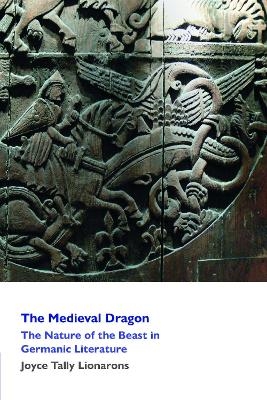
The Medieval Dragon
The Nature of the Beast in Germanic Literature
Seiten
2024
Welsh Academic Press (Verlag)
978-1-86057-160-2 (ISBN)
Welsh Academic Press (Verlag)
978-1-86057-160-2 (ISBN)
- Titel z.Zt. nicht lieferbar
- Versandkostenfrei innerhalb Deutschlands
- Auch auf Rechnung
- Verfügbarkeit in der Filiale vor Ort prüfen
- Artikel merken
Examining how dragons are portrayed in the epic masterworks, Beowulf (Old English), Vǫlsunga saga (Icelandic), Das Nibelungenlied (Middle High German), and þiðrekr saga af Bern (Old Norwegian), Joyce Tally Lionarons explores the relationship between the dragons of medieval Germanic literature and the chaos monsters of Indo-European myth.
The popular fascination with dragons and dragon slayers is manifest in the endlessly repeated plots of sword-and-sorcery romances and in the mass-produced artwork that illustrates their fantastical characters and themes. Yet the image of a knight in shining armour who fights a solitary battle against a winged, fire-breathing dragon in order to win the hand of a fair maiden is more common in modern popular culture than in medieval literary fiction.
Applying modern theoretical literary perspectives to medieval heroic sagas to investigate the concept of draconitas or ‘dragonness’, The Medieval Dragon investigates the nature and characteristics of Germanic literary dragons and dragon slayings as they relate to contemporary ideas about myth and narratological theory.
Examining how dragons are portrayed in the epic masterworks, Beowulf (Old English), Vǫlsunga saga (Icelandic), Das Nibelungenlied (Middle High German), and þiðrekr saga af Bern (Old Norwegian), Joyce Tally Lionarons explores the relationship between the dragons of medieval Germanic literature and the chaos monsters of Indo-European myth, while searching for the reasons behind the often uncanny similarity between the dragons and their antagonists, the dragon-slayers.
The popular fascination with dragons and dragon slayers is manifest in the endlessly repeated plots of sword-and-sorcery romances and in the mass-produced artwork that illustrates their fantastical characters and themes. Yet the image of a knight in shining armour who fights a solitary battle against a winged, fire-breathing dragon in order to win the hand of a fair maiden is more common in modern popular culture than in medieval literary fiction.
Applying modern theoretical literary perspectives to medieval heroic sagas to investigate the concept of draconitas or ‘dragonness’, The Medieval Dragon investigates the nature and characteristics of Germanic literary dragons and dragon slayings as they relate to contemporary ideas about myth and narratological theory.
Examining how dragons are portrayed in the epic masterworks, Beowulf (Old English), Vǫlsunga saga (Icelandic), Das Nibelungenlied (Middle High German), and þiðrekr saga af Bern (Old Norwegian), Joyce Tally Lionarons explores the relationship between the dragons of medieval Germanic literature and the chaos monsters of Indo-European myth, while searching for the reasons behind the often uncanny similarity between the dragons and their antagonists, the dragon-slayers.
Joyce Tally Lionarons, retired Professor of Medieval Literature at Ursinus College, Pennsylvania, is author of The Homiletic Writings of Archbishop Wulfstan (Boydell & Brewer) and editor of Old English Literature in its Manuscript Context (University of West Virginia Press).
Preface
1. Dragons and Dragon-Slayers
2. Beowulf and the Beowulf Dragon
3. Fáfnir
4. Sîfrit
5. A Wilderness of Dragons
6. Conclusion
Notes
Bibliography
Index
| Erscheint lt. Verlag | 17.10.2024 |
|---|---|
| Verlagsort | Cardiff |
| Sprache | englisch |
| Maße | 156 x 234 mm |
| Gewicht | 235 g |
| Themenwelt | Literatur ► Klassiker / Moderne Klassiker |
| Sachbuch/Ratgeber | |
| Geisteswissenschaften ► Sprach- / Literaturwissenschaft ► Anglistik / Amerikanistik | |
| Geisteswissenschaften ► Sprach- / Literaturwissenschaft ► Literaturwissenschaft | |
| ISBN-10 | 1-86057-160-3 / 1860571603 |
| ISBN-13 | 978-1-86057-160-2 / 9781860571602 |
| Zustand | Neuware |
| Haben Sie eine Frage zum Produkt? |
Mehr entdecken
aus dem Bereich
aus dem Bereich
Poetik eines sozialen Urteils
Buch | Hardcover (2023)
De Gruyter (Verlag)
59,95 €
Buch | Softcover (2024)
belleville (Verlag)
20,00 €


